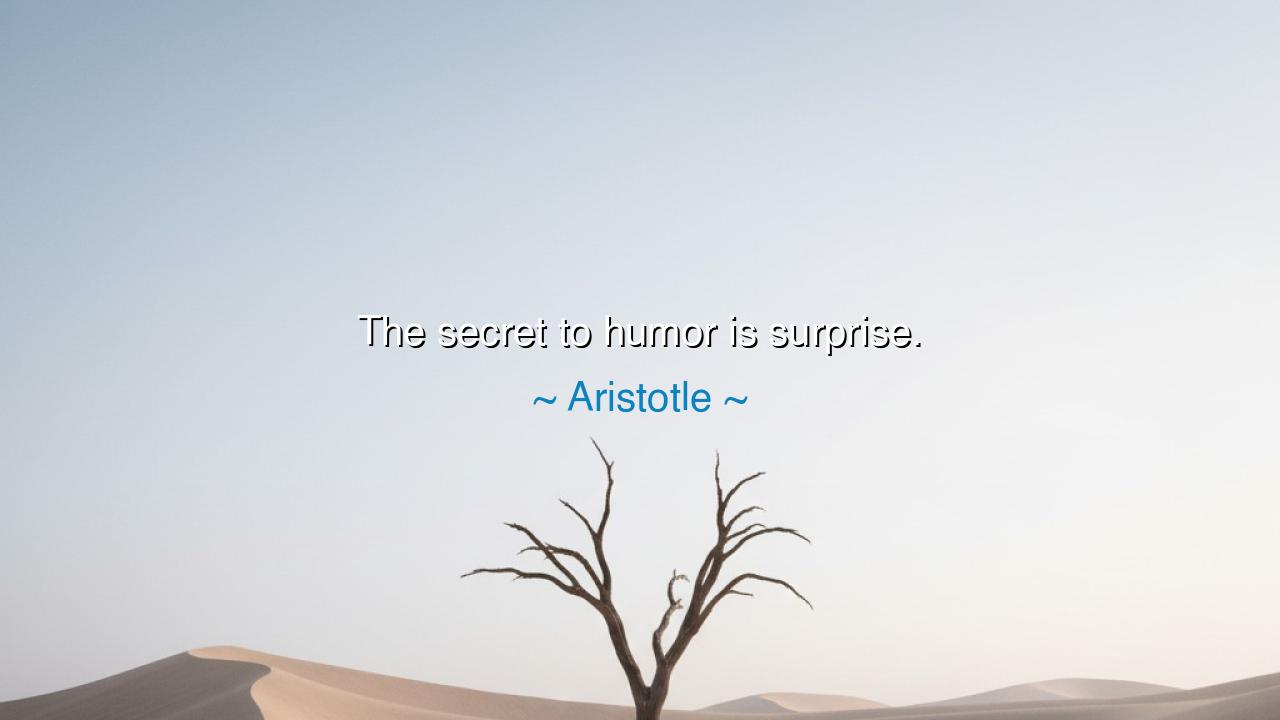
The secret to humor is surprise.






In the radiant halls of ancient philosophy, where thought was shaped like sculpture and speech was the art of wisdom, Aristotle — master of logic and student of Plato — once declared: “The secret to humor is surprise.” In this brief yet profound statement, he revealed not only the anatomy of laughter, but a key to understanding the human soul itself. For what is humor, if not the sudden recognition of the unexpected — the moment when the mind, anticipating one path, is gently or sharply led another way, and in that reversal finds delight rather than despair?
Aristotle lived in an age when comedy and tragedy walked hand in hand. As he observed the great playwrights of Athens — Aristophanes, with his bold satire, and Euripides, with his tragic irony — he came to understand that both laughter and sorrow spring from the same soil: the conflict between expectation and reality. Surprise, then, is the soul’s awakening. It is that instant when the curtain is lifted, and the truth appears not as we imagined it, but as it truly is — twisted, absurd, beautiful, or painfully honest. The laughter that follows is the spirit’s way of rejoicing in discovery.
To say that humor is born of surprise is to acknowledge that the mind delights in contrast — the unexpected harmony of opposites. When a joke turns sharply, when the conclusion mocks the beginning, when what is feared turns harmless or what is serious becomes ridiculous, the intellect leaps. In that leap lies laughter. The ancients knew this instinctively; their comedies were built upon inversion, upon the reversal of roles — the slave outwitting the master, the fool speaking wisdom, the pompous man undone by his own pride. Through laughter, they revealed that all of life is filled with such divine irony.
Consider the tale of Diogenes the Cynic, that wild philosopher who lived in a barrel and mocked the vanity of Athens. When Alexander the Great, the conqueror of the world, came to visit him and asked what he could do for him, Diogenes replied, “Stand out of my sunlight.” The onlookers roared with laughter, for in that simple, unexpected reply lay a deeper truth — that power means nothing to the free soul. Diogenes’ humor was surprise shaped into wisdom, and his jest still echoes through the centuries. It was not cruelty that made it funny, but revelation — the unveiling of the absurdity within human pride.
Aristotle’s insight also touches upon something greater than mere jest — it speaks to the nature of perception itself. The human mind, in its pursuit of order, craves predictability. But the soul — that deeper current within us — craves wonder. Surprise is the bridge between logic and wonder. It shakes us awake, reminding us that reality is never fully within our control. Humor, in this way, is kin to philosophy and even to faith. It teaches us to be humble before life’s unpredictability, to see not only the pain in irony but the beauty in imperfection.
Even in modern times, this truth endures. The best storytellers, writers, and comedians still wield surprise as their sacred tool. A good joke, like a good parable, does not simply entertain — it transforms perspective. When life itself betrays our expectations, humor becomes survival. The soldier laughs in the trench not because war is funny, but because laughter turns fear into endurance. The mother laughs through exhaustion, the teacher through chaos, the philosopher through ignorance — for to laugh is to conquer the shock of existence without hardening against it.
So, remember this, my friend: to laugh is to understand life’s unpredictability and to accept it with grace. Cultivate surprise not only in humor, but in your heart. When plans collapse, when life takes a turn you did not foresee, do not curse the twist — see in it the same spark that gives rise to laughter. The unexpected is not always tragedy; sometimes it is revelation wearing a smile.
And thus, as Aristotle taught, the secret to humor is surprise — but the secret to wisdom is knowing that all of life, too, is a series of surprises. To greet them with laughter instead of fear is to live as the ancients lived: awake, humble, and free.






AAdministratorAdministrator
Welcome, honored guests. Please leave a comment, we will respond soon